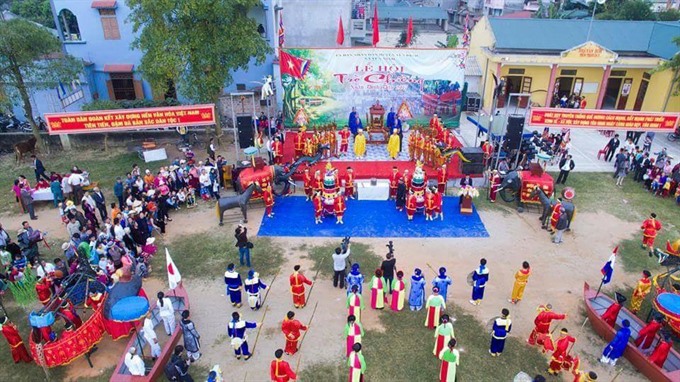 Life & Style
Life & Style

Central Thanh Hóa Province’s intangible heritages - Trò Chiềng Festival and Sing and Dance under Bông Tree Festival - are being recorgnised as national culture intangible heritages by the Ministry of Culture, Sports and Tourism.
 |
| Colourful culture: Trò Chiềng Festival is held from January 10-12 of the lunar calendar in Thanh Hóa Province. Photo ttptntthanhhoa.gov.vn |
HÀ NỘI — Central Thanh Hóa Province’s intangible heritages - Trò Chiềng Festival and Sing and Dance under Bông Tree Festival - are being recorgnised as national culture intangible heritages by the Ministry of Culture, Sports and Tourism.
The Trò Chiềng Festival is considered the most anticipated festival in Thanh Hóa, which is being held since the rule of the Lý Dynasty. The founder of the festival is General Trịnh Quốc Bảo, who served during the reign of King Lý Thánh Tông (1054-1072) and is credited with defeating the Chiêm Thành (Champa) invaders.
To prepare for the fight against the invaders, who used elephant troops, the general ordered his soldiers to build bamboo elephants to practice with. During the battle, bamboo elephants which were glued with fireworks attached to them were burned, helping to defeat the invaders’ troops.
A martial arts game with bamboo elephants was reproduced at the festival to welcome the coming of spring in 1068 and was held by villagers of Trịnh Xá Village, Yên Định District.
Currently, the villagers hold the festival on January 10-12 of the lunar calendar. The festival is organised on a large scale with many folk games and cultural activities, including a paper elephant fighting competition, in which groups of men hoisting paper elephants attempt to topple each other.
The Sing and Dance under Bông Tree Festival originated from Thanh Hóa Province’s Thái ethnic group. It is held to pay respects to people, helping locals settle down and be protected. The Thái people also sing and dance under the Bông tree on the occasion of the harvest.
Southern Ninh Thuận Province also has two heritages - Kate Festival of the Chăm ethnic group and the art of making pottery in Bàu Trúc Village listed by the Ministry.
The ministry in its recent decision added seven more festivals to the list of national intangible cultural heritages. They include Lady Hai Festival of the Tày ethnic group in the northern mountainous province of Cao Bằng, Lảnh Giang Temple Festival in the northern province of Hà Nam and Chiêu Trưng Temple Festival in the central province of Hà Tĩnh.
These seven national intangible cultural heritages that were recently recognised belong to the three categories of traditional festivals, traditional crafts, and social customs and beliefs. — VNS




